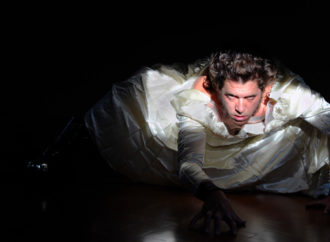Better sometimes a woman blind than one too beautiful…Tell a woman that she is beautiful, and the devil will repeat it to her ten times…A rich man is never ugly in the eyes of a girl

Woman’s Beauty
She’s beautiful and therefore to be wooed;
She is a woman, therefore to be won.
— 1st Henry VI. act v. sc. 3
“A BEAUTIFUL woman,” remarked Napoleon, “pleases the eye, a good woman pleases the heart; one is a jewel, the other a treasure.” It is not surprising that the beauty of woman–in praise of which both literature and art have from the earliest period lavished some of their grandest works–should have given rise in most countries to a host of strange and romantic fancies. Many of these survive in our midst to-day, and, although experience has long proved how unreliable such beliefs are, they still retain their hold on the popular mind, often causing unnecessary prejudice and fear.
It is a very old notion, for instance, that beauty is unfortunate; and, according to an old Italian proverb, “Over the greatest beauty hangs the greatest ruin.” Allusions to this piece of folk-lore are not only found in the poetry and romance of bygone centuries, but are of frequent occurrence in the literature of modern times. Thus Goethe makes Helena affirm that beauty and happiness remain not long united and Byron, in his “Childe Harold” (iv. 42), speaks of “the fatal gift of beauty.” We may recall, too, Lord Tennyson’s charming and pathetic language in “A Dream of Fair Women,” where he relates how–
In every land
I saw, wherever light illumineth,
Beauty and anguish walking hand in hand
The downward slope to death.
Those far-renowned brides of ancient song
Peopled the hollow dark, like burning stars,
And I heard sounds of insult, shame, and wrong,
And trumpets blown for wars.
And there is a well-known passage where Fielding, in his “Journey from this World to the Next,” (chap. vi.), thus writes: “She–Fortune–was one of the most deformed females I ever beheld, nor could I help observing the frowns she expressed when any beautiful spirit of her own sex passed her, nor the affability that smiled on her countenance on the approach of any handsome male spirits. Hence I accounted for the truth of an observation I had often made on earth, that nothing is more fortunate than handsome men, nor more unfortunate than handsome women;” such, too, was the opinion of the host of the “Canterbury Tales” who bewailed the sad fate of Virginia related by the Doctor of Physic:–
Allas! too deare boughte sshe her beauté,
Wherefore I say, that alle men may se,
That giftes of fortune, or of nature,
Ben cause of deth of many a creature.
Her beaute was hir deth, I dar well sayn,
Allas! so piteously as she was slayn.
And there is the old mythical tale which tells how Medusa was a maiden of such beauty as to provoke the jealousy of Minerva, wherefore she was transformed into a frightful monster. Her much-admired ringlets became hissing serpents, and no living thing could look upon her without being turned into stone. Legendary lore provides us with many stories of this kind, which illustrates Patterson’s well-known lines:–
O fatal beauty! why art thou bestowed
On hapless woman still to make her wretched?
Betrayed by thee, how many are undone!
Chinese folk-lore maintains that beautiful women are unlucky, one of their many proverbs on the subject declaring that “fair maidens are very unlucky, and clever young men have little beauty.” It was also supposed that feminine beauty of unusual merit was fatal to long life, and no subject has been more popular with the novelist, or poet, than the gradual fading away of some young girl gifted in a high degree with good looks.
Lord Tennyson, in his “May Queen,” has interwoven this idea, and it is found scattered here and there in the literature of most countries. Hence, another reason why beauty has been regarded as unfortunate is owing to its being thought prejudicial to health, a variation of which belief occurs in “Richard III.” (act iii. sc. i), where the Duke of Gloucester says:–
So wise, so young, they say do never live long.
Another misfortune connected with beauty is its evanescence, and, as the German proverbs run, “Woman’s beauty, the forest echo and rainbows, soon pass away,” and “Maidens and roses soon lose their bloom.” And the same truth is conveyed in the Hindustani proverb, “The spring in which he saw the blossoms is gone, now, O bee, only the thorns remain on the rose;” another version of which is, “My fair one don’t be proud of your complexion, it is the guest of but a few days.” Poets have largely dwelt on beauty’s transient character, and Shakespeare, in “The Passionate Pilgrim,” says:–
Beauty is but a vain and doubtful good;
A shining gloss that vadeth suddenly;
A flower that dies when first it ‘gins to bud,
A brittle glass that’s broken presently,
A doubtful good, a gloss, a glass, a flower,
Lost, vaded, broken, dead within an hour.
And the oft-quoted adage that “Beauty is like an almanac; if it last a year it is well,” reminds us of Moliér’s lines in his “Les Feminies Savantes”:–
La beauté du visage est un frele ornement,
Une fleur passagére, un éclat d’un moment,
Et qui n’est attache qu’ a la simple epiderne.
The snares of beauty have been made from early times the subject of much proverbial wisdom, a Servian adage affirming that, “Better sometimes a woman blind than one too beautiful;” for, as the Italian proverb adds, “Tell a woman that she is beautiful, and the devil will repeat it to her ten times;” with which may be compared an old Welsh proverb, which has been translated thus:–
Three things may make a woman nought
A giddy brain,
A heart that’s vain,
A face in beauty’s fashion wrought;
and the German proverb adds, “An impudent face never marries.” There is, too, the old English adage, “The fairest silk is soon stained;” for, as Ray has said, “The handsomest women are soonest corrupted, because they are most tempted.”
Although we cannot endorse the old German proverb which says that, “Every woman would be rather pretty than pious,” yet most women are mightily proud of their beauty, for, as an early English maxim reminds us, “She that is born a beauty is born married;” another version of which we find in an old work entitled, “New Help to Discourse” (1721, P. 134), “Beauty draws more than five yoke of oxen;” with which we may
compare Pope’s lines in “The Rape of the Lock” (Canto ii.):–
Fair tresses man’s imperial race insnare,
And beauty draws us with a single hair.
The same idea occurs in French proverbial lore, but it is thus qualified:–
Amour fait beaucoup
Mais argent fait tout;
and according to German proverbial lore, “Beauty is a good letter of introduction,” and, “Good looks are an inheritance,” and again, “A pretty face is a good drummer;” but, on the other hand, it is said, “A poor beauty finds more lovers than husbands.”
It is not surprising that in all ages women have striven to preserve their beauty, however transient it may be, for, as it has been remarked, “it is valueless to a woman to be young unless pretty, or to be pretty unless young;” and an amusing story is told of an old queen who, day after day, sighed with longing regret that her beauty had vanished, and that her young days were gone. In this sad dilemma she was advised to try some magic restorative to bring back the rosy blush of youth, and accordingly–
Of rosmayr she took six pounde,
And grounde it well into a stownde,
and then she mixed with it water, in which she bathed three times a day, taking care to anoint her head with “gode balme afterwards.” In a few days her old withered face fell away, and she became so young and pretty that she began to look out for a husband.
But, unfortunately, stories of this class belong to the domain of fairyland, or, otherwise, old age would have a bad time of it, for every woman would remain young if not beautiful. At any rate, there is no disguising the fact that the human brain has done its very best to accommodate the fair sex with the charm of juvenescence, judging from the rules laid down for this purpose; a popular folk-rhyme advising us thus:–
Those who wish to be fair and stout,
Must wash their faces with the disclout;
Those who wish to be wrinkled and grey,
Must keep the disclout far away.
The common wayside flower, the lady’s mantle, was once in great repute with ladies; for, according to Hoffman, it had the power of “restoring feminine beauty, however faded, to its early freshness;” and the wild tansy, laid to soak in buttermilk for nine days, had the reputation of “making the complexion very fair.” The hawthorn, again, was in high repute among the fair sex, for according to an old piece of proverbial lore:–
The fair maid who, the first of May,
Goes to the fields at break of day,
And washes in dew from the hawthorn-tree,
Will ever after handsome be;
and the common fumitory “was used when gathered in wedding hours and boiled in water, milk, and whey, as a wash for the complexion of rustic maids.”
Various allusions to these old recipes occur in the literature of the past, and we find the Earl of Shrewsbury–who had charge of the unfortunate Mary Queen of Scots–making an application for an increased allowance on account of her expensive habit of bathing in wine. Those who could not afford such an extravagant luxury contented themselves with milk-baths, which were all the fashion in the reign of Charles II.
Great importance, too, has long been attached to what is popularly nicknamed “Beauty Sleep,” it being supposed that the two hours’ sleep before midnight are worth all that comes after it, and are far more instrumental in keeping off wrinkles than all the cosmetics and expedients to which we have just referred, the faintest indication of which is a killing blow to womankind. Hence it is not surprising that, in the words of a Portuguese proverb, the marriageable young lady cries in despair, “marry me, mother, for my face is growing wrinkled.” The explanation given by Ray of the value of the so-called beauty-sleep is amusing: “For the sun being the light of this sublunary world, whose heat causes the motion of all terrestrial animals, when he is farthest off, that is about midnight, the spirits of themselves are aptest to rest and compose, so that the middle of the night must needs be the most proper time to sleep in, especially if we consider the greater expense of spirits in the daytime, partly by the heat of the afternoon, and partly by labour, and the constant exercise of all the senses; whereof then to wake is put the spirits in motion, when there are fewest of them, and they naturally most sluggish and unfit for it.“
But it is generally acknowledged that the attempt to cheat time of his wrinkles has nearly always proved fruitless, and only too frequently “the would-be fair ones have been driven in despair to conceal what they found it impossible to remove, and hence the feminine fashion of bedaubing the complexion with artificial tints, a custom which it may be remembered was almost universal among Grecian women.”
On the other hand, however much fortune may be reputed to be hostile to beauty, good looks have been termed “a woman’s glory,” and Galen perhaps was not far wrong in maintaining that one reason why misfortune is so often connected with beauty is that “many who have been distinguished for their loveliness have neglected the education of their mind,” for, as the German proverbs say, “Beauty and understanding go rarely together;” “Beauty is but dross if honesty be lost,” and there is the Tamil adage, “Beauty in the unworthy is poison in a casket of gold.” Some, like Ralph Nickleby, may disparage a woman’s beauty, but, as it has been remarked, one reason why beauty has been coveted by most women is partly owing to the early belief that a lovely face was the outward indication that a person so adorned was gifted with an equally beautiful soul within. It was long and extensively believed that a lofty soul could not dwell in an ugly casket, and hence a beautiful woman was commonly credited with having a fine and noble character, a notion which in only too many instances history alone has refuted, for, as an old proverb says, “Beauty may have fair leaves, but little fruit.” This once popular belief, however, was a favourite one with the poets, and is referred to in the “Tempest,” (act i. sc. 2):–
There’s nothing ill can dwell in such a temple:
If the ill Spirit have so fair a house,
Good things strive to dwell with’t.
And Young alludes to the same idea in these well-known lines:–
What’s female beauty, but an air divine,
Through which the mind’s all gentle graces shine?
They, like the sun, irradiate all between,
The body charms, because the soul is seen,
Hence men are often captives of a face
They know not why, of no peculiar grace.
Some forms, though bright, no mortal man can bear,
Some, none resist, though not exceeding fair.
Moralists and others have largely dwelt on this familiar idea, and, in one form or another, it has prevailed in most countries, and has been incorporated in many a legendary romance; an item of folk-lore which Sir A. de Vere Hunt has thus prettily expressed:–
What is beauty? not the show
Of shapely limbs and features–no!
These are but flowers
That have their dated hours
To breathe their momentary sweets, then go.
‘Tis the stainless soul within,
That outshines the fairest skin.
There would appear, however, to be an exception to this rule, for German folk-wisdom tells us that “A fair skin often covers a crooked mind,” and “A fair face may hide a foul heart,” which reminds us of the whited sepulchres of the New Testament; and it is further said in Germany that “Falseness often lurks beneath fair hair,” and there is the Spanish proverb, “A handsome woman is either silly or vain.”
But notions of beauty fortunately differ, and, according to a popular adage, “What is one man’s meat is another man’s poison;” and, whatever truth there may be in the proverb which reminds us that “Beauty is but skin deep,” there is no denying that personal appearance has made all the difference in the estimation formed by one person of another. According to an old folk-rhyme we are told that:–
A fair face is half a portion,
A fair face may be a foul bargain,
A fair face may hide a foul heart,
A fair field and no favour.”
The power of woman’s beauty over man, however, has always been proverbial all over the world, and, from the earliest period, it has formed one of the leading subjects of the wise-saws current in most countries. Thus a popular German maxim tells us that “one hair of a woman draws more than a bell-rope,” or, as another version has it, “Beauty draws us with a single hair;” and there is a common saying in the East, “A good-looking woman in a house is the foe of all the plain ones.” At the same time there have never been wanting moralists to warn us that, however powerful the fascinatory influence of woman’s beauty may be, it is far from being always supreme. Accordingly there are a number of proverbs which affirm that, whereas “beauty is potent, money is omnipotent,” with which may be compared the oft-quoted saying to the effect that, “Beauties without fortunes have sweethearts plenty; but husbands none at all;” or, as it is sometimes said, “Beauty without bounty avails nought.” Oftentimes those proverbs, which admit the fascinatory charms of a woman’s beauty, qualify their statements with a warning, as in the German proverb, “Beauty is the eye’s food, and the soul’s sorrow;” an old English maxim is to the same effect: “A beautiful woman is the paradox of the eves, the hell of the soul, and the purgatory of the purse;” and again, “Wickedness with beauty is the devil’s hook baited;” the same idea being found in Hindustani proverbial wisdom, in which we find this maxim: “All pretty maids are poisonous pests; an enemy kills by hiding these by smiles and jests.” It is said in Italy that “a beautiful woman smiling bespeaks a purse-weeping,” with which may be compared the German adage:–
Hares are caught with hounds,
Fools with praises,
Women with gold.
Indeed, in most countries there are numerous proverbs to the same effect, demonstrating how one of the penalties–one which oftentimes is man’s ruin–paid for woman’s beauty is an empty purse. Similarly, we are told that “a handsome hostess is bad for the purse;” and hence there is some truth in the following: “A rich man is never ugly in the eyes of a girl.”
Proverb-making cynics, again, have not always been very chivalrous and complimentary in their allusions to the charms of the fair sex. Thus, as beautiful women had the reputation of being less handy and serviceable than plain ones, the adage arose which says–“A fair woman and a slashed gown will always find some nail in the way;” in other words, as women value themselves on their personal attractions, they are in the same degree generally apt to be negligent in other things. According to another version of the same proverb, it is very commonly said that “the more women look in their glasses the less they look to their houses.” Cynical savings, happily, of this kind, as far as beauty is concerned, are in the minority; for, in most legendary and historical lore, good features have been made characteristic of nearly all superior and exalted beings. Hence, at the present day, beauty is often said to be “fairylike,” it having been a popular belief that beauty, united with power, was one of the most attractive forms of the fairy tribe. Such was that of Spenser’s Fairy Queen, and of Shakespeare’s Titania; and it may be remembered how, in “Antony and Cleopatra” (act iv. sc. 8), Antony, on seeing Cleopatra enter, says to Scarus:–
To this great fairy I’ll commend thy acts,
Make her thanks bless thee.
And in “Cymbeline” (act iii. sc. 6), when the two brothers find Imogen in their cave, Belarius exclaims:–
But that it eats our victuals, I should think
Here were a fairy,
and he then adds :–
By Jupiter, an angel! or, if not,
An earthly paragon! Behold divineness,
No elder than a boy.
Beauty, too, which Plato described as “a privilege of Nature;” Homer, “a glorious gift of Nature;” Ovid, “a favour bestowed by the Gods;” and Shakespeare, “that miracle and queen of gems,” has formed the theme of most of those traditionary tales of love and romance which, embodied in the folk-tales of different countries, portray the many beliefs and fancies which, in the course of centuries, have grouped round this acknowledged charm of womanhood.
The absence of beauty, on the other hand, was, in days of old, considered almost a disgrace, it having been a common idea that the ugliness of the wicked was in proportion to their evil nature. Hence, an unprepossessing appearance subjected the unfortunate woman to the most uncomplimentary stigma, and oftentimes even made her an object of contempt; for, according to an old proverb, “An ugly woman is a disease of the stomach, a handsome woman a disease of the head.” And there is the Hebrew adage, “Ugliness is the guardian of women,” for the chance is remote of those who are not gifted with beauty yielding to the snares of temptation. But even ugliness occasionally outweighs the advantages of beauty, for the German mother reminds her daughter that “a virtuous woman, though ugly, is the ornament of her house;” and there is the Spanish adage, which says, “the ugliest is the best housewife;” and our own proverb runs: “She’s better than she’s bonnie;” although a Tamil proverb, referring ironically to an ugly woman, speaks of her as “killed with beauty;” and a Welsh adage tells us that if an ugly woman fall, breaking her hip, the pity she gets is, “how clumsy to trip.” It has, however, been generally acknowledged that there is no woman who is not, more or less, fond of flattery, and there is a common saying in Spain, “Tell a woman she is pretty and you will turn her head,” a piece of proverbial lore which is found in France and Germany, and also in our own country. But, after all, there is one point to be remembered, for a popular German adage says that “handsome women generally fall to the lot of ugly men.” There is truth, also, in the Sindhi adage which says, “Better a blind eye than a blind fate,” which means, better be ugly than unfortunate, as many favored with beauty are supposed to be; for, after all, as the proverb truly remarks, “a good fame is better than a good face.” It is recorded that Madame de Bourignon was so ugly when born that the proposal was actually made of smothering her, so as to spare her a life of ridicule and humiliation; and, to quote a further illustration, a story is told of the Emperor Henry IV., of Germany, who, on entering a church, where an ugly priest happened to be officiating, wondered in his mind whether it was possible for God to accept services rendered by so ill-favoured a ministrant. But the imperial ministrations were interrupted by the priest’s boy mumbling, almost unititelligibly the versicle: “It is He that hath made us, not we ourselves,” whereupon the priest removed him for his indistinct enunciation, and he repeated the Psalmist’s words, which the Emperor took as an undesigned rebuke to his own thoughts.
Queen Elizabeth, similarly, was careful to admit into her household none but those of “stature and birth;” and one day, it is recorded, she went so far as to refuse the services of a certain individual for no other reason than that one of his jaws was deficient of a tooth. But there was Tamerlane’s wife, who, although she had no nose, was considered a belle by her contemporaries; and even hunchbacks have had their admirers on the ground that the “dorsal curvature is the true line of beauty.”
It has, after all, however, been generally admitted that beauty is, more or less, deceptive, and especially where love is concerned, for, as the popular adage says: “If Jack is in love, he is no judge of Jill’s beauty,” which corresponds with the Italian saying, “Handsome is not what is handsome, but what pleases.” Similarly, the French have a familiar proverb, “Never seemed a prison fair, nor a mistress foul,” which has its counterpart in Germany, where it is said, “he whose fair one squints says she ogles;” and “Everybody thinks his own cuckoo sings better than another’s nightingale;” with which we may compare what the African negro says, “The beetle is a beauty in the eyes of its mother“–love transforming all imperfections into beauty. But, as an Eastern piece of proverbial wisdom reminds us–
For virtue a woman our our wife we make;
For her beauty we a concubine take,
with which may be compared another Eastern adage:–
Long not for the Goddess’s beauty divine,
Long that the star of your husband may shine.
The fact that love has a large mantle to hide faults is further shown in an Arab proverb: “Love is the companion of blindness;” and the Talmud emphasises the same truth: “To love a thing makes the eye blind, the ear deaf;” and a Hindustani proverb runs thus: “Fall in love with an ogress, and even she is a fairy,” with which may be compared another not very complimentary one, “Her name is Beauty, and a dog’s her face.” It is interesting to find the same idea in Assamese folk-lore, wherein occurs the following: “What shall I say of my step-mother’s character–in one hand she has chutney and in the other salt; she has no hair in the middle of her head, but her husband calls her the beautiful one?” And much the same idea is conveyed in the Hindustani piece of proverbial wisdom: “She cries over her own idiot, but laugh’s at another’s;” and the Dutch have a saying, “No ape but swears he has the handsomest children.“
Indeed, that in a lover’s eyes, plainness oftentimes becomes actual beauty, is exemplified over and over again in the literature of past and modern days, for, in “A Midsummer Night’s Dream” (act v. sc. i)–
The lover, all as frantic,
Sees Helen’s beauty in a brow of Egypt.
Lord Lytton, in “Kenelm Chillingly,” has introduced the charming song, “The Beauty of the Mistress is in the Lover’s Eye,” which runs thus:–
Is she not pretty, my Mabel May?
Nobody ever yet called her so.
Are not her lineaments faultless, say?
If I must answer you plainly–No.
Joy to believe that the maid I love
None but myself as she is can see;
Joy that she steals from her heaven above,
And is only revealed on this earth to me.
The same idea is introduced in Mrs. Browning’s “My Kate;” and Balzac, too, was of the same opinion, for he says, “When women love, they forgive us everything, even our crimes; when they do not love us, they give us credit for nothing, not even for our virtues.” But, on the other hand, there is equal truth in the Welsh proverb, which is only too frequently proved in the romance of daily life, “Faults are thick when love is thin.”
Some, again, have tried to disparage beauty by maintaining that it is only “skin-deep,” a notion which has found its way into proverbial lore. The literature of the past contains sundry allusions to this idea, and in the Rev. Rob. Fleming’s poems (1691) we are reminded that–
Beauty is but skin-thick, and so doth fall
Short of those statues made of wood or stone.
And in Ralph Venning’s “Orthodoxe Paradoxe” (1650) it is said that–
All the beauty of the world ’tis but skin-deep, a sunne-blast defaceth;
which is not unlike Sir Thomas Overbury’s lines in his poem, “A Wife”–
And all the carnall beauty of my wife
Is but skin-deep.
And yet there is much truth in the Hindu adage, “The eyes love beauty, the heart loves wisdom,” for, as it has been observed elsewhere, there is no denying the truth of the old French proverb, “It is not the greatest beauties that inspire the most profound passion;” and to the same purport is the German adage, “One cannot live on beauty.”
Previous / The Folk-Lore of Women / Next
Part of the collection of – A Wrinkle In Time
Backed Up and Credited by – no-maam.blogspot.com
































Leave a Comment
Your email address will not be published. Required fields are marked with *